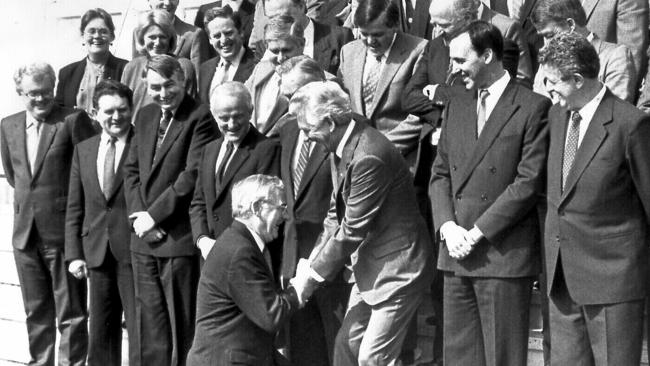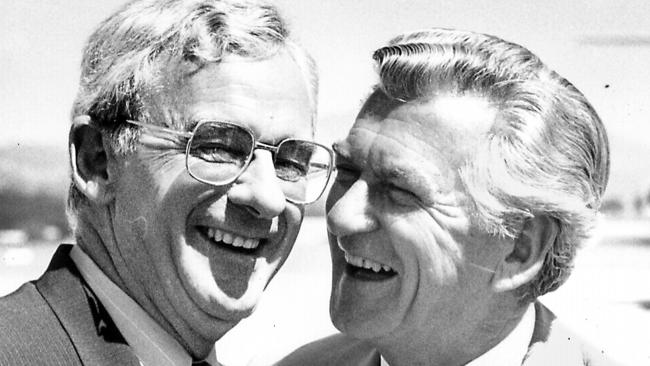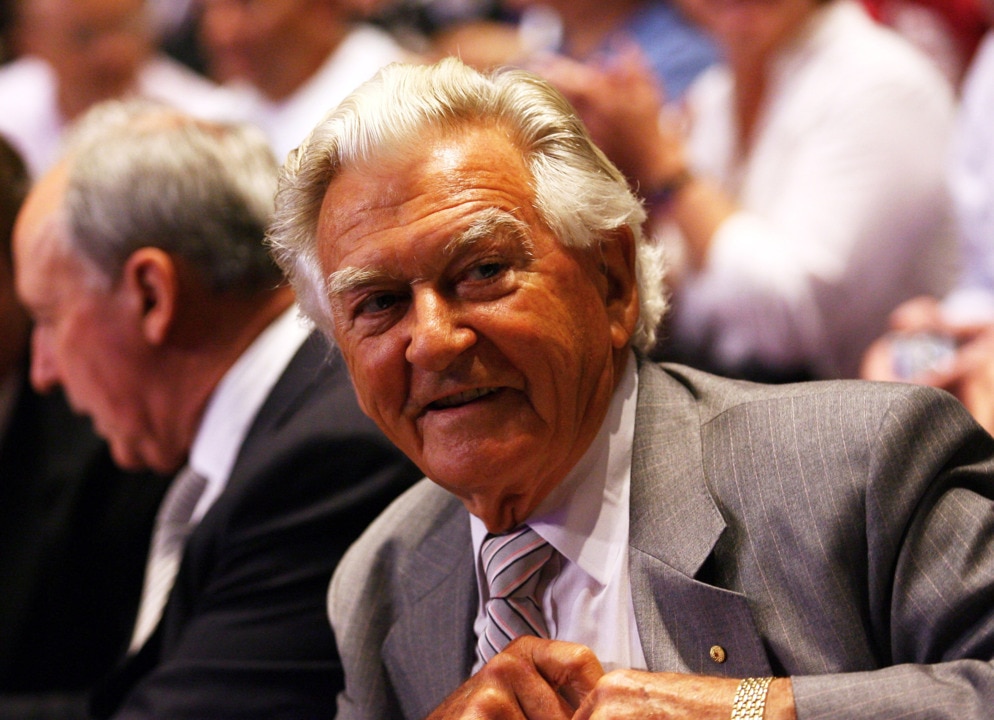Bob Hawke faces disaster, Bill Hayden told Queen
Bill Hayden told the Queen that Bob Hawke’s government was facing “an electoral disaster”, ahead of the 1990 federal election.

Bill Hayden told the Queen that Bob Hawke’s popularity defied rational understanding but the government he led was facing “an electoral disaster” ahead of the 1990 federal election.
The then governor-general predicted Labor would be defeated.
Mr Hayden’s secret vice-regal correspondence from 1989 to 1996, which contains sweeping analyses of politics, society and economy, and compelling pen-portraits of political figures that are sometimes sharply critical, is now accessible at the National Archives of Australia.
“The prime minister maintains his extraordinary popularity,” Mr Hayden wrote in October 1989. “The prime minister is not a good parliamentary performer, he rigorously eschews any use of subtlety or understatement in debate.
“He has a crackly Australian accent, loves the popular sports of ordinary people and evidences no interest in the finer qualities of modern lifestyle. For all of that, the people love him.”
Mr Hayden said the Labor government faced “a very real prospect” of “being defeated” at the next election.
While his “political instincts” led him to believe the government was doomed, he acknowledged it was “still in the race” because of the disastrous performance of the opposition. On the eve of the election in March 1990, however, Mr Hayden told the Queen that Labor would lose.
The former Labor leader and foreign minister in the Hawke government chronicled the leadership contest between Hawke and Paul Keating. He told the Queen that Hawke had lied about having a secret deal to hand over the leadership to his treasurer.
“The prime minister lied to the parliament and to the community by denying that he intended to stand down in favour of (Paul) Keating,” Mr Hayden wrote in June 1991.

He reported that advisers were looking at “face-saving” ways for Hawke to quit, while Mr Keating awaited a move to “draft him into the leadership” from the backbench.
“I assure you, Ma’am, that I am not engaging in a free or loose translation of what has been said,” Mr Hayden wrote about Hawke’s justifications for not adhering to the Kirribilli Agreement regarding the leadership.
“In any event, the government has been done a lot of harm by this unpleasant incident.”
By September, Mr Hayden informed the Queen that Mr Keating’s challenge was “stagnating”. In December, however, Mr Keating wrested the leadership from Hawke.
Mr Keating had been “relentlessly stalking” Hawke and “finally pounced on his quarry”. He blamed the stalled economic recovery, John Kerin’s performance as treasurer and a hostile media for Hawke’s demise.
Mr Hayden informed the Queen of his discussion with Hawke at Government House after he resigned the prime ministership. Hawke defiantly said he could have won the caucus ballot if he only had more time to talk MPs around, but Mr Hayden thought a narrow victory would not be enough.
“It would have been like a condemned man escaping the gallows because the rope broke,” he wrote to the Queen on Christmas Eve 1991. “A new rope would quickly be found. Hawke had to win and win well if he was going to destroy the Keating challenge for good.”

As early as July 1990, Mr Hayden predicted to the Queen that Mr Keating would launch a leadership challenge against Hawke. He referred to his own loss of the leadership in March 1983, when he made way for Hawke, and joked about “the unspectacular performance of the then leader”.
These letters, addressed to “Your Majesty, Madam” and signed off with “I have the honour to remain, Madam, your Majesty’s most obedient, humble, servant, Bill Hayden”, include candid assessments of personalities, political events and policy issues.
William Heseltine, the Queen’s private secretary, reassured Mr Hayden that the monarch read his letters, welcomed them and followed Australian politics closely. Academics who claim John Kerr’s letters were remarkably different to other governors-general are mistaken.
Mr Hayden described Mr Keating and finance minister Peter Walsh as “unpopular” but “the two great strengths” of the government in October 1989. Opposition leader Andrew Peacock was “lacking gravitas”. John Howard often upstaged Peacock. And John Hewson was the “bright star” in the opposition. By March 1991, he argued that Mr Hewson’s policies were “half-baked”.
These “periodic reports to the Queen” include assessments of the economy sliding into recession and insights into the electorate mood. Mr Hayden despaired over corruption in state politics. He noted the “sea of political discontent” in November 1990, said Labor’s traditional blue-collar constituency had “deserted it” and the party was “in diabolical trouble”.
These vice-regal letters, like those of Richard Casey, Paul Hasluck, Zelman Cowen and Ninian Stephen, contain many unnecessary redactions.
These redactions, made by the National Archives, are often absurdly comical in what they try to conceal from Australians.




To join the conversation, please log in. Don't have an account? Register
Join the conversation, you are commenting as Logout